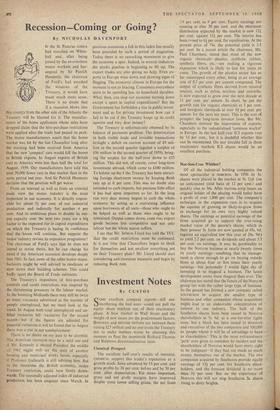Recession—Coming or Going?
By NICHOLAS DAVENPORT IF the St. Pancras rioters had marched on White- hall and, after being joined by the ex-overtime motor workers and har- angued by Sir Patrick Hennesiy, the chairman of Ford's, had smashed the windows of the Treasury, it would have made much more sense. There is no doubt that if a recession blows into this country from the other side of the Atlantic the Treasury will be blamed for it. The manufac- turers of the home appliances whose sales have dropped claim that the hire-purchase restrictions were applied after the trade had passed its peak. The motor manufacturers assert that the home market was hit by the last Chancellor long after the warning had been received from America that the new 'compact' cars would kill the boom in British exports. In August exports of British cars to America were less than half the total for August, 1959. Our manufacturers have sold this year 30,000 fewer cars in that market than in the same period last year. And Sir Patrick Hennessy declares that the position will get worse.
From an internal as well as from an external trade view the motor industry is the most important in our economy. It is directly respon- sible for about 3+ per cent. of our industrial production and indirectly for another 4 per cent. And its ambitious plans to double its out- put capacity over the next two years are a big factor in the expected rise in capital expenditures on which the Treasury is basing its confidence that the boom will continue. But suppose the motor industry revises its expansion programme! The chairman of Ford's says that he does not intend to revise theirs, but he can change his mind if the American recession develops deeply into 1961. In fact, some of the other motor manu- facturers might be well advised to moderate or ' slow down their building schemes. This could badly upset the Board of Trade estimates.
The Treasury's imposition of hire-purchase controls and credit restrictions was inspired by the threatening pressures in the labour market. In the booming Midlands there may still be twice as many vacancies advertised as the number of people unemployed, but we must look at the trend. In August both total unemployed and un- filled vacancies fell—vacancies for the second month—but if the figures are adjusted for seasonal variations it will be found that in August there was a rise in net unemployment.
There is no desire on my part to be alarmist. The American recession may be a mild one and if Mr. Kennedy is elected President the middle of 1961, might well see the start of another housing and municipal works boom, especially if Professor Galbraith is still advising him. But in the meantime the British economy, under Treasury restriction, could turn firmly down- wards. The seasonally adjusted index cif industrial production has been stagnant since March. In
previous recessions a fall in this index has usually been preceded by such a period of stagnation. Today there is no restocking movement to give the economy a spur. Indeed, in several industries the stocks pipeline is beginning to fill up. The export trades are also giving no help. Even ex- ports to Europe were down and showing signs of flagging. The economic climate in Europe for the moment is not so bracing. Consumers everywhere seem to be spending less on household durables. What, then, can stop our economy turning down except a spurt in capital expenditures? But the Government has forbidden a rise in public invest- ment and as for private investment how can it fail to be cut if the Treasury keeps up its credit squeeze and very dear money?
The Treasury is unfortunately obsessed by its balance of payments problem. The deterioration in both visible trade and invisible transactions brohght a deficit on current account of £9 mil- lion in the second quarter (against a surplus of £96 million in the second quarter of 1959), bring- ing the surplus for the half-year down to £35 million. This did not, of course, cover long-term investment abroad, which came to £100 million. To bolster up the £ the Treasury has been attract- ing foreign short-term money by keeping Bank rate up at 6 per cent. This was no doubt also intended to curb imports, but precious little effect it has had upon importers so far. In the long run very dear money begins to curb the whole economy by acting as a restraining influence upon borrowers of all sorts—those' who ought to be helped as well, as those who ought to be restrained. Output comes down, costs rise, export goods become less competitive and not only labour but the whole nation suffers.
I see that Mr. Selwyn Lloyd has told the TUC that the credit restrictions must be continued. Is it not time that Chancellors began to think for themselves and not swallow everything put on their Treasury plate? Mr. Lloyd should start considering anti-recession measures and begin by reducing Bank rate.










































 Previous page
Previous page